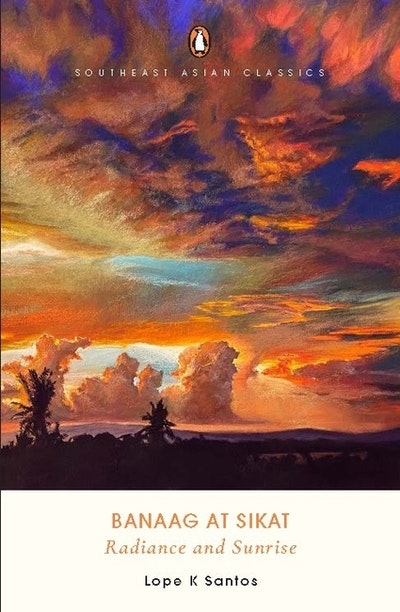- Published: 14 December 2021
- ISBN: 9789814914055
- Imprint: PRH SEA
- Format: Paperback
- Pages: 448
- RRP: $35.00
Banaag at Sikat (Radiance and Sunrise)
- Published: 14 December 2021
- ISBN: 9789814914055
- Imprint: PRH SEA
- Format: Paperback
- Pages: 448
- RRP: $35.00
‘Banaag at Sikat first appeared as a series in the Tagalog newspaper Muling Pagsilang (Renaissance) n 1904… It is now recognized as the most prominent work of the period known as the Golden Age of the Tagalog novel (1905-1921) and a milestone in the history of Tagalog fiction for its engagement with social issues…’
-Dr Patricia May B Jurilla Tagalog, Bestsellers of the Twentieth Century: A History of the Book in the Philippines
‘Lope K Santos’ Banaag at Sikat was the most important Tagalog novel of the early 20th century. Avidly read by the intellectuals and the masses, it influenced the workers to fight for economic, social, and political reforms. It became a Bible for the working men and women of the Philippines.’
-Professor Teodoro Agoncillo, author of A History of the Filipino People; National Scientist of the Philippines
‘The vigour and charm of style of Banaag at Sikat never fails. Santos knows how to sustain interest: he lets his people move and speak in a manner the reader can easily identify with. He knows the folk—both of his novel and his audience. He knows perfectly their mores, their ways of thinking, their vices and especially their language. The novel is rich in folk wisdom and homilies, which give added charm and character to this Tagalog classic.’
-Romeo P. Virtusio, Award-winning writer of Bilibid: Beneath the Prison Walls and Padre and Other Short Stories
‘In Banaag at Sikat, Lope K Santos succeeded in condensing the whole spiritual history of the Filipino ilustrado (‘the enlightened or educated ones’). . . The novel is a true exemplar of revolutionary art.’
-Dr Epifanio San Juan, Winner of the Association of Asian American Studies, Outstanding Book Award, Emeritus Professor, University of Connecticut
'Remoto is an accomplished writer whose fiction is marked by elegant and intense language. I am also impressed by the social concern in his writing, wrought well in images so clear it is like seeing pebbles resting at the bottom of a pond.’
- Sir Stephen Spender
‘Danton Remoto can capture curves of feeling and shapes of thought in both English and Filipino. His language is chiseled and lapidary. His structure is musical in its control and tonality. His eye and ear are perfect.’
-Professor Rolando S. Tinio, National Artist for Literature and Theatre
‘Danton Remoto is a smart and sensitive writer whose works ask many questions about our complex and colourful country.’
-Jessica Hagedorn, Shortlisted for the National Book Award for the novel, Dogeaters
‘Danton Remoto is an outrageously good writer. He writes with substance and style and he knows history—the context that shapes fiction—like the lines on the palm of his hand.’
-Carmen Guerrero Nakpil, Author of Heroes and Villains and Myself, Elsewhere, Winner of the South East Asia Write Award
‘Danton Remoto is such a wonderful writer. His books deal with the tropical Catholic magic that saves and destroys.’
-Tiphanie Yanique, Winner of the American Academy of Arts and Letters Award and the Flaherty Dunnan Prize for the novel, Love and Drowning
‘Danton Remoto is a poet, fiction writer, translator and journalist—one of the finest in South East Asia. He shows depth of feeling and great skill in his works. But I am also impressed by his compassion for the weak, the poor, the suffering in his books. He is a writer who cares.’
-Father Miguel A. Bernad, S.J., Editor-in-Chief, Kinaadman: A Journal of Southern Philippines
‘I like the passion and the intensity in the fiction of Danton Remoto. Most importantly, I like the fact that he writes with heart—which is the only way to write.’
-Bienvenido N. Santos, author of Scent of Apples and Other Stories Winner of the American Book Award
